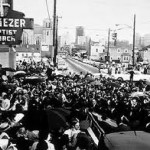 I attempted to undertake a bit of ethnographic research for my book about singing culture in the United States by visiting Atlanta’s Ebenezer Baptist Church on Palm Sunday. The church where both Martin Luther King and his father preached is a warm, friendly and obviously deeply historical place that ultimately revealed more about spoken word than song culture to me.
I attempted to undertake a bit of ethnographic research for my book about singing culture in the United States by visiting Atlanta’s Ebenezer Baptist Church on Palm Sunday. The church where both Martin Luther King and his father preached is a warm, friendly and obviously deeply historical place that ultimately revealed more about spoken word than song culture to me.
There wasn’t a spare inch of pew left in the house by 11.30 am when the service was in full swing. I think there were about 2,000 people present, but I’m not sure about the actual capacity.
Ebenezer boasts a choir of around 50 singers, all African-American. The mostly middle-aged male and female choristers generally sing together, yet are identified in the service program by two separate names — The Singing Sisters and The J. L. Roberts Men’s Chorus.
The acoustic in the room isn’t all that great for singing, though the rock-jazz instrumental ensemble that accompanies the singers comes through pretty cleanly. The sound, particularly from the women, is heavily vibrato-laden. On Sunday, the repertoire consisted of archetypal spirituals such as “Ride On, King Jesus,” arranged by the great spiritual composer, Moses Hogan, hymns like “All Hail the Power of Jesus’ Name” and the gospel tune “Make his Praise Glorious” arranged by Ed Lojeski.
Overall, the music was quite disappointing really. I was, surprisingly for an atheist of Jewish extraction, much more impressed and moved by the talk.
The only baptist service I have attended previously was at Al Green’s church in Memphis where singing is an extremely important part of the goings on. Green pretty much sings his way through his sermon with that incredible voice of his and the congregation joins in often, embellishing the melodies with melismatic abandon.
Attending Green’s church is an intense musical experience. I mistakenly imagined that this would be the case at all Baptist churches.
But despite the fact that the choir sang quite strongly at Ebenezer, very few members of the congregation sang during the service. They mostly listened politely to the choir and only joined in on “The Palms,” a song arranged by one “C. H. G.” for which lyric sheets were provided as inserts to the service program.
Ebenezer’s pastor, the extremely charismatic and smart Reverend Raphael G Warnock, PhD, doesn’t sing his sermon like Green does. But owing to Warnock’s melodious speaking voice, sense of humor and sensible view of the world, I was found that I was far more compelled by the spoken content of the Palm Sunday service than the sung one. The pastor spoke brilliantly about gun control and the misplaced enlightenment of pious people who consider themselves to be religious but aren’t good social citizens.
If I lived in Atlanta, I’d probably come back to hear Warnock preach. I learned a lot yesterday, even though I didn’t glean much that could help me with my book about singing.
Righto. It’s 6pm. I’m off to Passover supper at the home of the brilliant civil rights author, Melissa Fay Greene.
